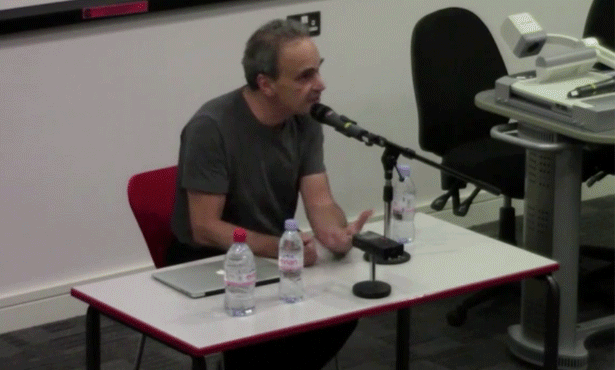www.artandeducation.net/videos
Kate Steinmann‘s Video School program considers various perspectives on the neoliberal subject. Exploring tensions between capitalism’s individuating force and the intersubjectivity it tends to obscure, the selected videos present this contemporary subject in a range of guises: human capital, homo economicus, entrepreneur of the self, investee, walking CV, research subject, psychiatric patient, social individual, transindividual, member of a future commons, post-subjective object, data set, and agglomeration of autonomous body parts.
In “The Journey to Self-Esteem: How Human Capital Blossoms,” French philosopher Michel Feher explores the concept of “human capital,” tracing transformations in its subjectivizing power. Feher argues that the subject that has emerged in the wake of capitalism’s financial turn has undergone a shift from entrepreneurial self to invested self.
In a recent lecture at MoMA PS1, feminist scholar and activist Silvia Federici discusses how we might go about creating a new society centered around the common good rather than on the accumulation of privately held wealth. She argues that such a project would entail reconceiving of what it means to be a human being. In a future realm of social relations beyond the confines of the nuclear family, she suggests, an entirely new form of subjectivity might emerge.
In “The Wound of Work,” philosopher Nina Power considers recent transformations of work, labor, and consumerism in relation to feminism, the body, biopolitics, and art. Power argues that we have become walking CVs, obliged to capitalize even on our free time and our private lives, turning them into assets. The body, too, is transformed, becoming an agglomeration of autonomous parts that assume the function of the whole; this body is perhaps no longer understandable as a vehicle for an interior subjectivity.
“American Neoliberalism: Michel Foucault’s Birth of Biopolitics Lectures” documents a rare meeting of French philosophy and American economic theory. Gary Becker—the Chicago School neoclassical economist who invented the concept of “human capital”—responds for the first time to Foucalt’s The Birth of Biopolitics, in which Foucault analyzed Becker’s work on human capital, crime, and punishment. French historian and philosopher François Ewald—who in the 1970s was assistant to Foucault at the Collège de France—discusses Foucault’s writings on Becker, and critical theorist Bernard Harcourt interprets Foucault’s views on neoliberalism.
In “The Social Individual: Collectivity and Individuality in Capitalism (and Marx),” philosopher Jason Read considers the concepts of the social individual and species being in Karl Marx’s early writings alongside French philosopher Gilbert Simondon’s work on individuation and transindividuality. Read argues that Marx’s and Simondon’s work reveals something about contemporary capitalism’s conditions of real subsumption.
In “The Culture of the Self,” a lecture delivered in English about a year before his death, philosopher Michel Foucault draws on ancient Greco-Roman traditions to consider technologies of the self and how they develop alongside particular forms of subjectivity.
In this interview with Sam Seder, political scientist Wendy Brown discusses the concept of “homo economicus” in the context of her recent book Undoing the Demos: Neoliberalism’s Stealth Revolution, in which she argues that neoliberalism and the transformation of the individual subject into human capital constitute a threat to democracy.
“Melanie Gilligan: Popular Unrest & Other Works,” a trailer from Spectacle Theater, introduces three video series by artist Melanie Gilligan—Crisis in the Credit System (2008), Self-Capital (2009), and Popular Unrest (2010). These works shed light on the visceral abstractions that produce the neoliberal subject, maintaining it in precarious tension as ostensibly coherent and autonomous yet fractured and infinitely fissionable.
Kate Steinmann is a writer, editor, and art historian based in Toronto. She is an editor at Fillip.
Video School features lectures and conversations chosen by artists and thinkers on issues relevant to their practice and/or contemporary artistic discourse. Organized thematically and highlighting current topics, Video School responds to the proliferation of educational videos circulating online selecting content pertinent to viewers.



